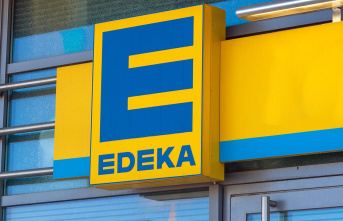The unusual lawsuit was not dismissed - but it is difficult to say how the legal dispute over more climate protection between an organic farmer and VW will end. The organic farmer Ulf Allhoff-Cramer received the adjournment by the Detmold district court on Friday with mixed feelings. "I'm glad that the court is continuing to negotiate," said the 62-year-old. But the follow-up appointment scheduled for February 3, 2023 is quite late: "I'm sad that we're losing half a year. We're running out of time."
The climate crisis is progressing "terribly quickly" and endangering the existence of many farms. The Volkswagen Group must finally take responsibility and change course more quickly than before.
With his lawsuit, Allhoff-Cramer wants to force the industry giant to stop selling cars and light commercial vehicles with internal combustion engines worldwide by 2030 at the latest. In May there was a first trial, which was sobering for the farmer: the presiding judge Manfred Pohlmeier had sentenced him to detention, so to speak. On Friday, the question arose as to what the Chamber would say about the amended complaints. It was possible that she would dismiss the matter and dismiss the lawsuit. That was not the case.
The judge spoke for only a minute. He found part of the lawsuit - a motion to set VW percentage CO2 reduction targets - to be "not specific" enough. Pohlmeier also criticized other, more subordinate parts of the lawsuit. A VW spokeswoman later interpreted this attitude as "serious doubts" about the allegations. The company has moved to dismiss the complaint.
Allhoff-Cramer's attorney Roda Verheyen assessed the judge's statements differently. She was pleased that he had omitted part of the lawsuit - namely the request for a sales ban after 2030. Verheyen concluded that this application was admissible because it was not named: "That's good, that's a positive sign."
Greenpeace supports farmer
The farmer is supported by the environmental organization Greenpeace. A similar case against Volkswagen is pending before the Braunschweig district court, where two Greenpeace directors and a Fridays for Future activist are suing. Other car manufacturers are also confronted with climate protection demands in various courts - the German Environmental Aid, for example, is taking action against BMW and Mercedes-Benz. Final decisions are not yet foreseeable.
VW rejects the allegations in the Detmold proceedings and emphasizes its progress in e-mobility. In addition, the vast majority of the CO2 emissions from cars lie within the sphere of influence of the driver and not the manufacturer. In addition, the concrete consequences of climate change for a small area cannot be precisely predicted, according to VW.
The question of binding phase-out dates for new combustion vehicles has long been a central point of contention between climate protectionists and the automotive industry - also and especially in the case of Volkswagen. Greenpeace repeatedly accuses the largest European industrial company of not doing enough to combat global warming.
VW does not want to commit itself to a specific time
VW is continuously expanding its range of electric vehicles and also wants to gradually supply the plants with more green electricity. But the Wolfsburg-based company shy away from a fixed end date for the sale of classic diesel and petrol engines that would apply to all group subsidiaries and sales areas, citing regional differences.
Depending on the country and brand, the plans are different. In Norway, for example, the VW, Audi and Skoda importer no longer wants to import combustion engines from 2024. The sales-off there so far only refers to the core division, it is said from Wolfsburg. The following applies to the rest of Europe: “The Volkswagen brand will sell the last vehicle with a combustion engine between 2033 and 2035, Audi in 2033.”
The new VW CEO Oliver Blume wants to meet the demand for diesel, petrol or natural gas vehicles "for many more years", even if full electrification is to make the breakthrough in the long term. The EU Parliament and the EU Commission intend to ban the approval of new combustion engines from 2035. This does not apply to used cars with classic drives.
Greenpeace actions against VW
There have often been public disputes between Greenpeace and VW. Activists have organized multiple protests at the automaker's main plant, where they lowered banners from buildings. Train tracks around the Wolfsburg factory site were also blocked.
In 2012, Greenpeace members hijacked a VW general meeting, and the chief supervisor at the time, Ferdinand Piëch, called them "troublemakers." And to a TV commercial by VW with allusions to the Star Wars saga, the environmental organization had a satirical counter-spot shot in which it slandered the Volkswagen headquarters as the "Death Star".
One of the more recent campaigns was the removal of hundreds of car keys from finished models at the VW plant in Emden in spring 2021, which then ended up on the Zugspitze in Bavaria. Greenpeace chose the neighboring Schneeferner glacier because it was particularly affected by climate change. The then VW boss Herbert Diess usually took the intimate enmity of both sides in a sporty way. On Twitter he wrote about the "invitation" to pick up the keys from the high mountains: "Gladly Zugspitze, but I can't do it today - don't want to use the plane. Soon in good weather?"







